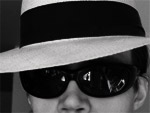Oh the horror; Oh the joy!

Week of: 01/22/07
Abstract: What a mixed bag; oh the horror; oh the joy! My trauma rotation ends.
What went well: I was provided with plenty of opportunity to select techniques.
What needs work: You ever feel like a deer in the head lights?
Mood: Discouraged yet hopeful, chatty.
Elucidation: How did the week go? I'm trying to be the optimist here and say, pretty good. I'm getting better at predicting what the tech needs and expects. You need to be good at dealing with strong personalities. If you wilt under pressure, then your up for some rough days, sister. I was more proactive in my own eduction by asking if I could attempt a comp of parts of many exams. Sometimes those ended in abject failure. Most of the time, they ended in a lovely learning experience.
Most of the techs treat me like an peer. Others, at times, treated me like a idiot. I still think of my self as a beginner and I tend to use that as an excuse. The techs in trauma sometimes confuse first year students with second years. Second year students have many hundreds of hours of experience. I'm getting there.
I work in the hospital fifteen hours a week. Maybe I won't know exactly how to position a T-spine, because we haven't gotten the examples. I don't take it personally though, because I know it's needful to get the exam done in a timely manner.
I want to give you a real situation. One of the techs screamed at me, “You should know what size cassette to use for a T-spine!” Her point is that I've observed the exam many times. My point is that with out covering the exam in lecture and lab, I don't have handle on doing it; I might be able to think it through, but it's not yet automatic. In retrospect, maybe I should. But it my own defense, I'm more of kinesthetic learner; I learn by doing. And I haven't done much. This week offered plenty of opportunity.
If the patient is injured grievously, than it's helpful when the nurse gives them meds. that wasn't the case when we began an exam that included every extremity possible and imaging the whole spine. The hard part was that the patient couldn't lay still because she was in so much pain. The exposure times are such that any motion causes blurring.
The patient wasn't able to objectify anything that was happening during the exam because of her dementia. I have to admit that I was wowed by her charm. She was so precious with her plaid dress and gentle child-like manner and words.
It's not realistic in this context to expect a patient to lie still and understand the situation is temporary. And it's not realistic to expect a second quarter student to always pick the right size cassette and technique. How realistic is it for me to expect a trauma tech to be patient with my learning process in an acute situation?
Not very, these people aren't trained teachers. I come from an educational background. When I'm a tech I will be honored to be part of the student process. At the same time, I'll need to step in at times and say, “Do you mind if I take over here in the interest of time. Patients are waiting.” I expect that I'll always treat students with respect. I haven't earned it yet.
I think though my expectations are high of myself and the experience. I don't come across as competent as I would like. It's an issue; how do I become more able. I am proud that I didn't wilt under pressure. I showed heart when it counted. Another cliché comes to mind: If it were easy to accomplish, would it be worth it? I'm having fun in spite of all that.
I had the experience of imaging a six hundred pound patient. Wow, talk about scatter: Nothing but a blob of white and a few suggestions of lung on the image.
Have a great week.
Goals for next week:
Ortho is Disney Land for fist year students: Six comps.
A continuation of previous weeks goals.


4 Comments:
I think you guys have it rough. I know many many schools start students at their clinical sites from the start, but geez. I didn't start at my clinical site until I was done with all of my positioning classes and able to on my own, complete ANY exam (atleast on a walky talky ;).
It suprises me that they expect you to really get alot from a trauma situation, when you don't even know all of the exams being performed. I'm at the point where I wish we had more trauma, because I've gotten so little experience.
We had a major car accident this week and we got 3 of the 6 involved. I got to do 2 of the patients on my own (while one was in CT, I did the other, then they switched).
It was hard. It took FOREVER on one of them. My CI was breathing down my neck. I made stupid mistakes. But I did it, on my own, and was thanked by the patient when I took them back to the ED.
Hmm so I guess I'm just saying it takes time. And even people who are supposed to be graduating in 6 weeks get flustered ;) hang in there, ortho will be a breeze now!
Hi Mary,
Thanks for the kind words. On one hand, I know that being to expected to work at that level is good for my development, it tends to increase the stress level. I like that we're often directly involved in exams we haven't covered in lecture/lab.
My particular case required two techs. One to position and hold and the other to set techniques and select and run cassettes. The problem was that my tech didn't recognize that she needed to be the one to hold the pt, (Students aren't allowed to hold pt's,) until well into the exam.
I wasn't up for everything that was thrown at me but I gave my best shot. And I grew from the experience.
Sounds like you did good on your trauma case. I like trauma because you have to think quickly and it's so fast paced.
I imagine you have a positioning lab at school. Is it open to students at times other than scheduled labs? Get a couple of your fellow classmates together and practice in the lab whenever possible. After class, after lab, on a day off, whatever. Practice routine exams, simulate trauma situations, ect. Learn from each other. Make your mistakes in the lab, not at clinical. Practice until the proper actions become automatic, much like a martial artist mastering the craft through nearly endless repetition.
Thanks Anonymous: You're so right. The lab is open most days after 12:30. I've been making excuses not to do it: I live 23 miles from school, I'm taking 15 credits and with clinical I feel maxed as it is...
In the end, what makes me more competent is also beneficial to the patient.
Post a Comment
<< Home